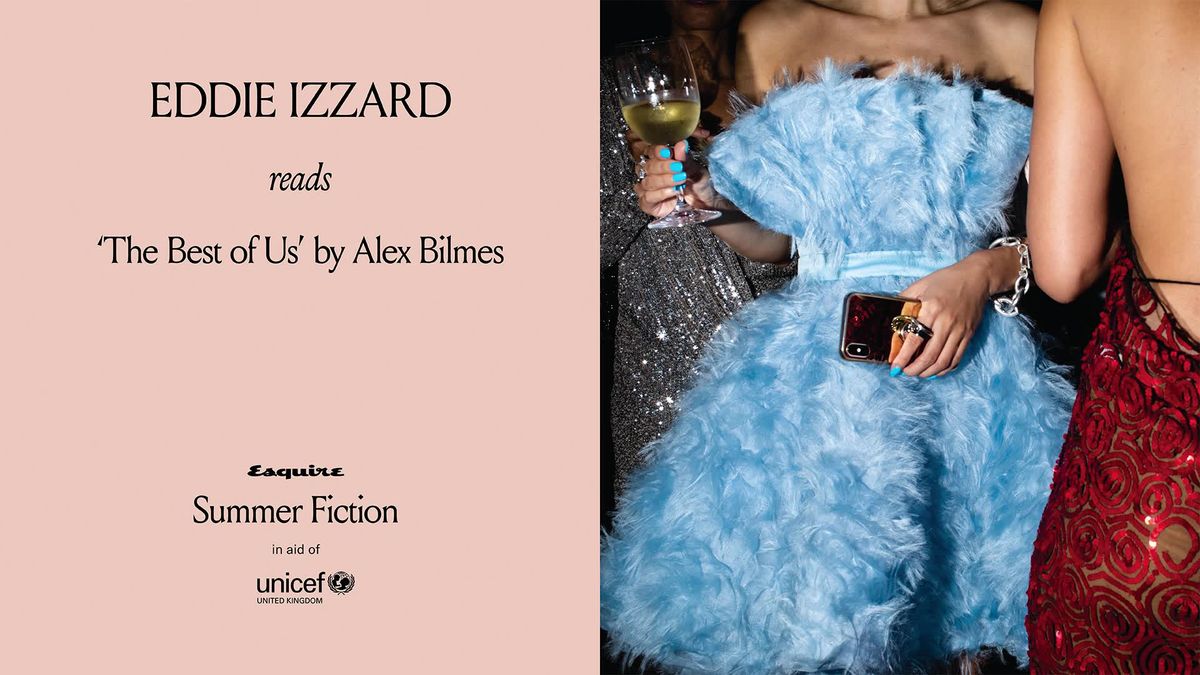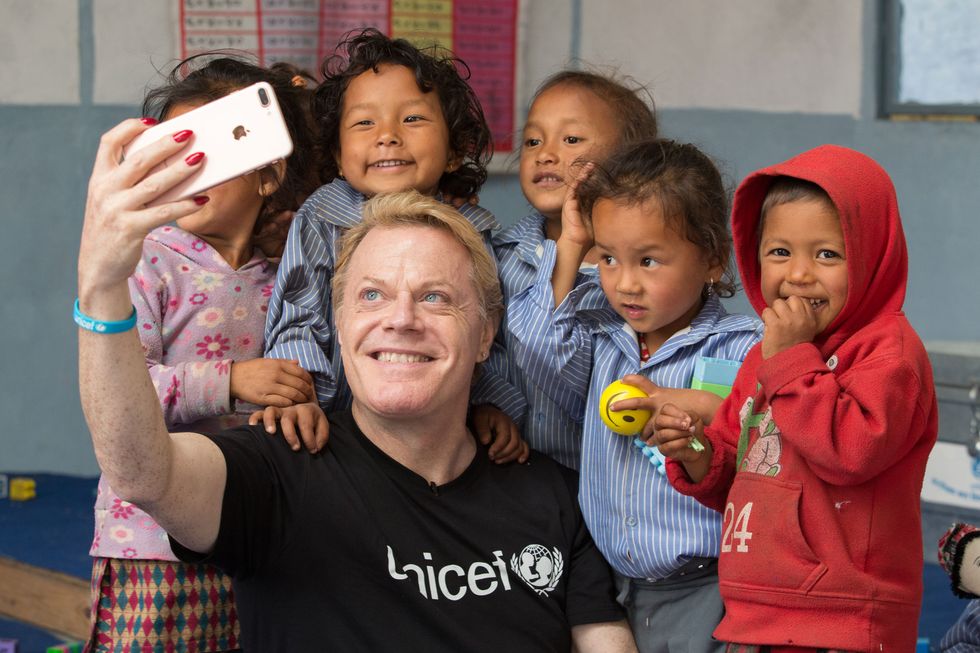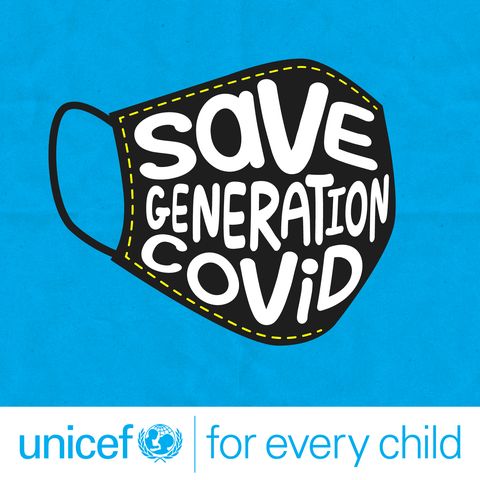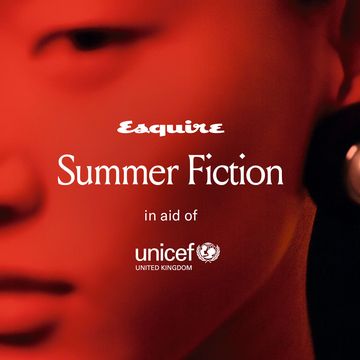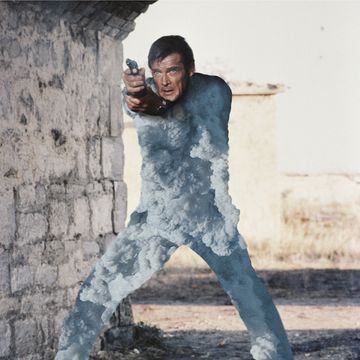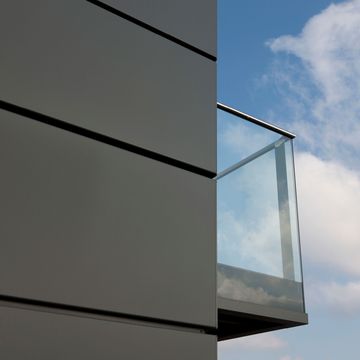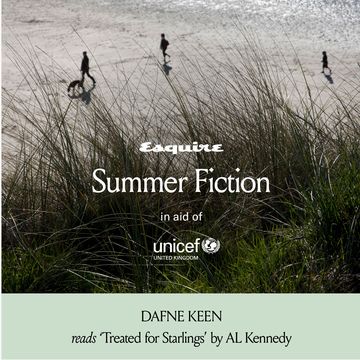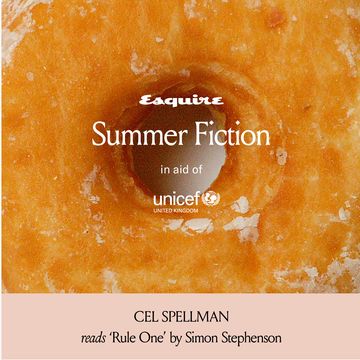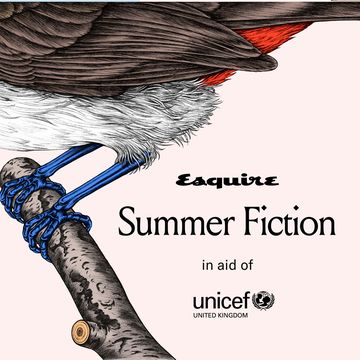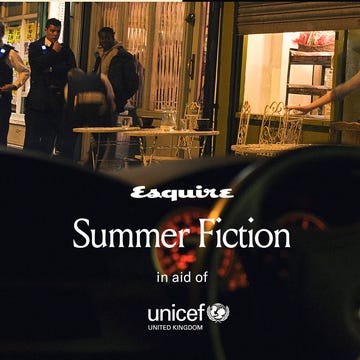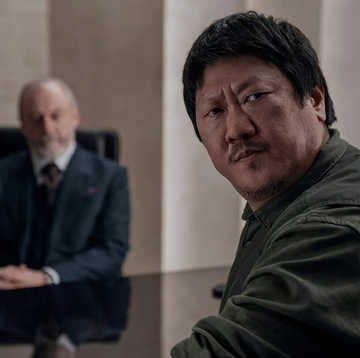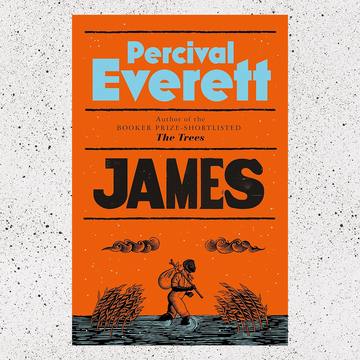Esquire's Summer Fiction series, in aid of Unicef UK, brings together some of the world's finest writers, and greatest actors, for a collection of original stories and readings that offer, we hope, a ray of light in these dark times, as well as the chance to raise funds for Unicef's Generation Covid campaign. (Read Unicef ambassador and Esquire editor-at-large Andrew O'Hagan's piece on why the campaign is so vital here).
Where a child is already experiencing hardship, outbreaks of diseases bring a new emergency to an already precarious situation. This is the story of Generation Covid. For vulnerable children all over the world, it poses the biggest threat since the Second World War. Please enjoy these stories, then visit Unicef UK's Generation Covid page to donate and hear a special message from Unicef UK Ambassador, Eddie Izzard.
DONATE NOW
Audio: read by Eddie Izzard
To listen, click 'Unmute' in the video at the top of this page. Alternatively, listen and download on SoundCloud, or listen on YouTube.
'The Best of Us' by Alex Bilmes
He waited for her outside the stage door, his back pressed against the wall to shield him from the rain.
His assignment: to greet her and then to escort her from car to dressing room. There he would wait with her until she was called to the stage. If all went to plan, he would be in her company for no more than 10 minutes. Ten minutes. It was a good length of time, no mere pass on the stairs, yet not so long as to become gruelling, for both of them. Ten minutes was doable. But then he’d been told, just now, that the awards show was running late, by a quarter of an hour. It might be necessary to entertain her for a short while. He didn’t imagine her as the type of woman who was accustomed to being made to wait, or who would enjoy the novelty of the experience now.
He carried an umbrella decorated with the logos of the website and the sponsor of the website’s awards show, a well-known make-up brand. This he was to raise as the car approached, so that she would be protected from the drizzle. He was unsure whether, as the car came to a stop, he was to open the door for her himself, or if, as he’d seen in movies, including one of hers, a bodyguard would render him redundant, leaping from the passenger seat while the car was still moving, simultaneously opening her door and shielding her from would-be assassins, as if she were a monarch or a world leader.
A large black car approached, headlights on, moving haltingly, as if unsure when, or whether, to stop. The car was so wide its wheels came close to grazing the kerbs on both sides. This must be her. He wondered what he should say.
“Hello, I’m Paul, from the website. Thanks for coming.” Perhaps the website part was unnecessary?
“Hello, I’m Paul. Thanks for coming.” Perhaps the Paul part was unnecessary?
“Hello, thanks for coming.” Thanks for coming?
“Hi, I’m Paul. Please follow me.” Better: masterful. But too curt? It sounded like an order. She might not appreciate an order.
The large black car drew close, appeared for an elongated moment to pause, and then passed by. Had the driver missed the stage door? At the end of the alley it stopped, indicated left, and turned towards Tottenham Court Road. Perhaps it wasn’t her?
The stage door opened behind him. The stage manager’s head popped out. He had a ring through his eyebrow. His hair was gelled into spikes, like an eager Eighties schoolboy’s. He was wearing a maroon bow tie.
“No sign?” said Eyebrow Ring.
“Don’t think so,” said Paul. He tried to look nonchalant.
“Break a leg, buddy,” said Eyebrow Ring, and, with all the gravitas of a breakfast show DJ, he gave Paul a double thumbs-up, before disappearing.
She had been due at 8.45, 15 minutes ahead of her scheduled appearance on stage. It was now 8.49. Another car appeared at the far end of the alley. It came closer. It was a sports car, not a limousine. It cruised past him, splashing water on his ankles. He was wearing his blue suit. It was tighter than he’d remembered. He’d had to breathe in to fasten the trousers.
A third car approached, a BMW. As it pulled up, he could see a small, dark woman sitting in the back seat. Moving involuntarily, as if on strings, he walked over to the door and opened it. She looked up at him. He was holding the furled umbrella.
“Hi, I’m Paul. I’m going to be looking after you.”
Where did that come from?
“Hello, Paul,” she said, drawing out the vowels, a smile playing on her lips, an eyebrow raised. Just like in a… oh, why not admit it? Just like in a film.
She swivelled in her seat and placed first one spike-heeled shoe and then the other onto the pavement, ignoring his proffered hand and clasping, instead, his forearm. For a split-second, he felt the pressure of her fingers. She stepped past him towards the door, which was being held open by Eyebrow Ring, in his shiny suit. Paul followed, wondering if he ought to open the umbrella, but she’d already made it inside.
She was wearing a long black coat over a navy knee-length dress. Diamonds sparkled on her neck. Her hair, jet black, was pulled back into a bun. She was compact, wiry. It was a dancer’s body and she moved with a dancer’s precision. With economy. With purpose.
In the lobby, she paused. Paul was introduced to the women accompanying her — the entourage, he hadn’t noticed them until now — both of whom were sheathed in black. He didn’t catch their names, they didn’t ask his. There was a bodyguard, too, unsmiling in a suit and tie.
The party moved off again, the bodyguard and Eyebrow Ring in the lead, followed by the women in black, then her. Paul brought up the rear. They were moving at quite a clip. He was conscious that he ought to be beside her, making the most of the moment, representing the brand. He stepped up his pace, his eyes on her ankles as they covered the ground. As he drew alongside her, he became aware that he might be crowding her. And then, in any case, he couldn’t think of anything to say.
“Paul,” she said, breaking the spell. “What do you do, Paul?”
She remembered his name. That was nice. But why did she keep repeating it like that?
“I’m the senior editor,” he told her, aware of how this managed to sound both pompous and pathetic at the same time.
“You’re the senior editor,” she said, as if weighing each word for comic potential, and deciding that “senior” was definitely the most promising. “Are you nice to the junior editors?”
She was making fun of him. It was badinage, of a sort. A one-sided sort. But he could do this. He could be her straight man for a few minutes.
“I like to think so,” he said. “You’d have to ask them.”
It was only when they had reached the dressing room that he became aware of how famous she was, how familiar her face. The almond eyes, the prominent nose, the chin dimple — the iconic chin dimple, as websites like his called it — and that widescreen smile, those glossy, red lips. He felt a jolt. It rooted him to the spot. The thought of movement in her presence made him feel clumsy, oafish. Best to stand still, try not to stare, keep his mouth shut. This tiny American woman was for the first time recognisably the mythic figure who had wallpapered the world of his adolescence.
The dressing room was low-ceilinged, windowless, over-lit. On tables, plates of canapés and bottles of water. Generic stack-away chairs lined the perimeter. She didn’t sit down. Neither did Paul. He stood quietly beside a fruit bowl and listened to her conversation with the shorter, more solid of the black-clad women. This woman had a very dark mole on the tip of her nose, made starker by the sickly pallor of a person who didn’t often go outside. She was complaining she couldn’t get reception on her phone.
Mole Nose knocked on the door to leave the room. It was opened from the outside by the bodyguard, who had taken up position in the corridor. Now Paul was alone with her. She shrugged off her coat and held it out at arm’s length, in his direction. He took it from her, felt the softness of the fabric, folded it and placed it carefully on a chair. The navy dress was fitted, belted, with a high collar and tight sleeves down to the elbows. It was oddly demure, somehow both sober and provocative. It showed her off.
There was a bottle of Champagne in an ice bucket, next to the fruit. He seized the moment. Would she like a drink?
She narrowed her eyes, deciding. “Why not?”
He grabbed the bottle by the neck, cold and wet, and pulled it from its bucket. He arranged two crystal saucers and began to wrestle, as tenderly as possible, with the cork. It came loose obligingly, offering only a quiet pffft, rather than an explosive pop.
He poured, allowing for the fizz, and passed the glass to her.
“Aren’t you going to join me?”
He poured for himself. He crossed the room to her and, hitting his mark, successfully clinked her glass. She was motionless. Still she made no move to sit.
“Cheers?” he ventured.
“Cheers,” she said. Was she imitating his accent?
He took a gulp. She sipped so briefly he wondered how any liquid could have made it past her lips. She looked… she looked exactly like herself, sipping a saucer of Champagne.
There was, he felt, tacit acknowledgement that this encounter was considerably more exciting for him than it was for her, and also that this was fine, it was inevitable. It was as it should be. That as long as it didn’t go on too long, they could both play their roles: the regal star, worldly and wryly amused; the dumbstruck civilian. Acknowledgement, too, that this was a meeting he would remember for a very long time; and that she would never think about again. That he would make sure to clasp her in his memory, to fix her exactly as she was at this moment, when he had her, however briefly, to himself; and that she would struggle the following morning, were she to be asked, to pick him from a line-up of journalists of wildly varying shapes, sizes, ages, ethnicities, even genders.
“So… they told me to ask you what you’re wearing,” he said.
She did not pause to consider this.
“I’m wearing Mind Your Own Fucking Business,” she said.
“I don’t think I know that designer,” he said. “Is he Japanese?”
“Oh, he’s funny!” she said, and she performed a mock curtsey.
She’d said he was funny. He filed it away for future use.
“I’m wearing Givenchy.” She said it in a high camp way, accentuating the French pronunciation, to let him know that it was no big thing. She was unexpectedly playful. He’d been prepared for business-like, even stern. He began to find he was enjoying himself.
She looked around the room, as if taking it in for the first time. The flowers, the fruit, the finger food.
“Can I get you anything else?” he asked.
“Is this a part of your job?” she asked.
“I volunteered,” he said. This wasn’t quite an answer but it was the truth.
“You volunteered,” she said, as if confirming a suspicion. Was she always like this?
It was early September. There they stood, with their Champagne saucers. Unable to think of anything else, desperate to avoid a long silence, he asked if she’d had a good summer. She took it on the dimple. She said she had spent part of it in London, actually. Actually, she said, as if to prove a point.
She had been working here. She loved London, she said. She pronounced it “Lundin”. But it had been a wet summer. She found the rain irritating. Irritating, she said, like a leaky tap, something that should be fixed.
She put down her glass. It was still full.
“What’s your star sign?”
She asked this in the manner of someone who had practised her lines.
What was his star sign? “Capricorn!” he said, triumphant.
“Mm, hmm.” She nodded, as if that made perfect sense, based on available evidence.
“I’ve no idea what it means,” he said. He thought astrology was for morons. Apart from her. She wasn’t a moron. Was she?
“Paul the Capricorn,” she said. She wondered if he liked to have things just so? He agreed that he did, without knowing if that was true. Did he like to have things just so?
“What about you?” he asked.
“I’m a Leo with Virgo rising. Ambitious, impatient and detail-oriented.”
He didn’t pick up, straight away, on what she was telling him. So she said it more plainly. “I’m ready to go.”
Outside, the women in black were having intense phone conversations. He couldn’t see any of the production people running the show.
“Are we good to go?” said Mole Nose, pointing at her wrist, where a watch would be if she wore a watch. Evidently, she could feel the passing of time through her skin.
“I’ll just find out,” he said, breathlessly, to indicate urgency.
He scuttled down the corridor, in and out of empty dressing rooms similar to the one he’d left her in. He was looking for Shaun, the producer of the awards show. Shaun was a big man, with a red face, squeezed into a blue velvet dinner jacket. It was hard to imagine him going missing for long. When at last Paul found him, Shaun looked harried.
“She’s ready,” Paul said. “She wants to do it now.”
Shaun winced.
“Sorry, my love,” he said. “Not gonna happen. We’re running over. We’ll call her in… 10?”
“No, you don’t understand,” Paul said. He wanted to say: she’s ambitious, impatient and detail-oriented. He wanted to say: I need this to be the end.
But Shaun was pressing two fingers to an earpiece and, with his other hand, fiddling with the knob on a walkie-talkie. Probably summoning Eyebrow Ring.
Paul walked back to the dressing room, ever so slowly. Her bodyguard opened the door without acknowledging him.
“Two minutes,” he lied to her, striding into the room with more confidence than he felt. He was surprised to find her still alone. Her back was turned to him. She was facing the wall, palms on either side of her, pressed onto a table.
It took him a beat to realise that something had changed. The room had been upset. A tray of canapés was in the wrong place. It should have been on a table. Instead it was face down over the carpet, surrounded by sushi rolls. Two plates of dips had taken a tumble too. Substances, Levantine in origin, were smeared across the floor. A lonely can of Diet Coke had rolled across the room and come to rest by the leg of the chair he’d folded her coat on. There was shattered glass, the base of one of their Champagne saucers, the stem jagged.
He moved across the room to pick it up. Where was everyone else?
“I’m ready now,” she said. Her voice was deep, unsteady. She still hadn’t turned around.
“I think maybe some of the speeches ran over just a minute or two,” Paul said. He was still holding the broken glass, wondering where to put it down.
“I have a dinner to go to,” she said.
“After this?” he said. Stupid.
“No,” she snapped. “Tomorrow. Yes, after this.”
He stared at her back. He took in her cinched waist, her hips. There was something insect-like about her body. Like a wasp. She was looking up at the ceiling, shoulders rising and falling. This wasn’t because she’d been made to wait. This had nothing to do with him. None of it had anything to do with him. It was none of his business. When finally she turned around, the look on her face was fierce. He recognised it from one of her performances. He wasn’t sure which. There were so many.
“Would you pass me my phone?” She pointed across the room. He could see the phone on the floor, half concealed by a banana.
He bent down to retrieve it, handed it to her. The screen was smudged. Blood? Tears? Hummus? She wiped it on the tablecloth, and stared at it, perplexed, as if trying to comprehend its purpose. Or perhaps she was disgusted by it and daring it to justify its existence.
“Fucking asshole.” Her voice was husky. “Don’t you ever call me again, motherfucker.”
She was speaking to the phone’s screen. It was clear that whoever had been listening, no longer was. Nobody could hear her but Paul.
“Is everything OK?” he said. His voice sounded thin, reedy. English.
He tried again. “Is there anything I can do?”
For the first time, then, she sat down and rummaged in her bag. He sat down too, relieved, a few chairs along from hers, his hands under his thighs, swinging his feet like a schoolboy. While she took out a compact and fixed her eyes, he stared at her knees.
Satisfied, she clapped the compact shut, rose and opened the door. “Evelyn,” she hissed. “Evelyn!” Had Evelyn not heard her the first time?
“What’s up?” Evelyn said. She was English, posh. Paul hadn’t noticed before.
“What’s up,” she said, “is the problem you told me you’d dealt with is calling me again, on my cell.”
“Jesus,” said Evelyn. She was looking around the room, taking in the disorder. She had her hands on her hips. “Again?”
“Did you hear what I said?”
“I heard you,” said Evelyn, her voice clipped. “But then I got distracted by… this.”
“God! Fuck! I’m upset, OK?” She sounded like a teenager, exasperated but also embarrassed. Evelyn was silent, grim-faced. As delicately as possible, Paul put the broken wine glass beside a vase of white flowers.
“Wait there,” Evelyn said, having assessed the situation and decided on a course of action. She opened the door and spoke quietly to the bodyguard. Next Evelyn squatted, her long, trouser-suited legs splayed. A different kind of insect. A mantis. She began picking up the pieces of nigiri, placing them on the dropped tray. He bent down to help her, scooping grains of rice and raw fish into his palm.
Her: “Are you going to give me an explanation?”
Evelyn: “Why don’t you go first?”
Her: “I lost my temper because you didn’t do your fucking job.”
Evelyn: “You lost your temper because you have control issues.”
Her: “Do. Your fucking. Job. OK?”
Paul cleared his throat, to remind them both that he was still there. Evelyn, wiping up spilled Champagne with a napkin, said, “Would you mind awfully stepping outside for a moment?”
As he left the room, he peeked at her, sitting primly on her chair, fists clenched in her lap, twisting a piece of tissue. “Don’t be a stranger,” she said to him, her tone a sarcastic sing-song.
In the corridor he collected himself. It had been a glancing blow. He’d heard worse. No damage done. Through the dressing room door he could hear voices raised. The bodyguard and Mole Nose were wearing expressions of profound tranquillity, or desperate boredom. One or the other.
The door flew open again. Evelyn came through it first. He thought there might be the beginnings of a smirk on her face. She followed, once again composed.
“Let’s go,” she said to Paul. “You lead the way.”
He walked with her down the staircase to the side of the stage, the others trailing behind. He felt the physical force of her, the impatience of her movements. Then he could feel the eyes of the room turn in her direction. Their direction. Her presence had not been announced in advance. It was to be a surprise. An “oooh” moment, his boss had called it.
They waited in the wings. Her gaze was fixed on the stage. He didn’t wonder, then, who the man who’d called her might have been. Was it even a man? Yes. It was a man. Or what about his call had so enraged her. Or why Evelyn tolerated her behaviour. Enough to know she could be cruel. She could be petty. She was a spoilt, petulant child. None of that mattered. None of that would matter. She looked incredible.
Her name was spoken from the stage, and he could hear gasps, and she was out there under the lights, her hand being kissed by the host, an unctuous TV presenter. Her speech was short, charming, gracious. People clapped and whooped. She presented the award to her friend, a climate activist, the reason she had agreed to come. They left the stage together and Paul waited in the wings while they had their photographs taken in front of the corporate logos. She hugged the activist goodbye, and then Paul was walking with her again, back up the stairs and along the same corridors, past the dressing room to the stage door. He was aware that Eyebrow Ring and Mole Nose and, of course, Evelyn were following them, but right then only he was level with her, walking alongside her.
Outside in the alley, her car was ready, its rear door open for her. It had stopped raining. She turned back and offered her hand, very dainty, and he shook it.
“Thank you for coming,” he said. Formal, polite.
“My pleasure,” she said. Her grin was fixed.
“I’ll try not to be a stranger,” he said. It was a line he’d thought of a few minutes earlier, watching her on stage, planning what he would say to her by way of farewell. It had sounded better in his head.
For a moment she looked blank, even lost. Then, as if prompted from off-stage, she rallied.
“Sorry about before,” she said. She gave him a shit-happens look. “Little tired, I guess.”
“Don’t mention it,” he said. “Happens to the best of us.”
She hadn’t heard him. She’d turned around already and was getting into the car. Evelyn slid into the seat beside her, and the car moved off. He watched the lights disappear into the night.
In the years afterwards, his encounter with her would become a favourite anecdote, told and retold, polished to a shine, edges smoothed. He left out Evelyn, and the mystery caller, the tantrum, the broken glass, the stains on the carpet. The story was about him, not her. About how he’d had her all to himself for 20 minutes, the most glamorous woman in the world, about how they’d traded witticisms and drunk Champagne. In his telling she remained herself, as she should be, as she always would be: unruffled, immaculate, not quite human.
Alex Bilmes says:
“As editor of Esquire, I do occasionally still dip a toe in the celebrity PR paddling pool – a pretty sad and deflated item these days, a sediment of grime visible beneath its dirty, lukewarm water – but there was a time when I was up to my neck in it, and having the time of my life. For a period of a decade and more, from around the year 2000, celebrity wrangling for glossy magazines was my main gig. My late twenties and all of my thirties were spent schmoozing Hollywood publicists, in the hope of an interview, a cover shoot, a personal appearance, from a A-list movie star or musician. Since childhood I have been pathetically impressed by glamour, beauty, fame. Now I was allowed (limited) access to all that, and I like to think I made the most of it.
"What I hope I never did was confuse it with journalism. Celebrity profiles and celebrity appearances are a branch of marketing. In almost every case, the job is absolutely not to expose the 'true character', whatever that means, of the famous person concerned. Instead it is to burnish their public image, polish their star, make them look even better than they already do, in the hope that this will encourage other, even bigger stars, to submit to the same treatment. It’s that complicity between journalist and celebrity, and media and entertainment industry, that I wanted to explore in this story. Also, you know, big star, close-up, BEHIND-THE-SCENES EXCLUSIVE!”
This story appears in the July/August issue of Esquire.
SUBSCRIBE NOW
Alex Bilmes is a journalist, writer and the editor-in-chief of Esquire UK.
Since 2011, British actor and comedian Eddie Izzard has travelled extensively with Unicef UK. His first trip, to Kenya, was to film a documentary about the children’s emergency in East Africa. Izzard was born in Aden, Yemen, and has been hugely successful as a comedian and actor all over the world. He has performed on the West End and Broadway, and has also had a varied film career, starring in Ocean’s Twelve, Victoria and Abdul and many others, including 2020’s Six Minutes to Midnight alongside Dame Judi Dench.
